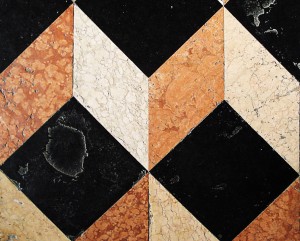How do you remove a chemical etch-mark, which is not a stain but surface damage?
Polished marble, travertine, onyx, limestone, etc., are all calcite-based stones, and as such are affected by pH active liquids, mostly acidic in nature. In layman’s language, when an acidic liquid gets on a polished marble, travertine, slate, etc. surface, it etches it on contact. That is, it leaves a mark of corrosion that looks like a water-stain or ring. Such surface damage has nothing to do with the absorbency rate of the stone (typically quite low, anyway), but exclusively with its chemical makeup, which, as mentioned before, is mostly calcite (Calcium Carbonate, CaCo3). Trying to remove the “stain” by poulticing it would be useless exercise, since it is not a stain, no matter what it looks like.
So, how do you remove a chemical etch-mark, which, as seen, is not a stain but surface damage?
You don’t! In fact an etch mark can be effectively compared to, and defined as, a shallow chemical scratch. A scratch is something missing (a groove), and nobody can remove something missing. It would be like trying to remove a hole from a doughnut! The only thing one can do is to eat the doughnut, and . . . the hole is gone! Same thing with a scratch: you must actually remove whatever is around the groove, down to the depth of the deepest point of the scratch.
You are actually facing a full-fledged—though small in size—stone restoration project! Is this a task for the average homeowner? The answer is: maybe.
If it is polished marble, travertine or onyx, then there’s hope. If it is hone-finished marble or travertine, or hone-finished slate (like a chalk-board), or mixed “granite”, then you probably should hire a professional stone refinisher. If it’s a cleft-finished slate (rippled on its surface), then nobody can actually do anything about it, other than attempt to mask it by applying a good quality stone color enhancer.
While marble and other calcite based stones are vulnerable to acids, granite is much more resistant. In fact, the only acid that will etch polished granite is hydrofluoric acid, commonly found in rust removers.
If the etch is light (the depth is undetectable by the naked eye, and it looks and feels smooth) then a polishing compound for marble will work quite well without requiring the experience of a professional and no specific tools are needed, other than a piece of terry cloth.
Do you have problems with etching? Call Facility Specialists at (267) 331-5369 today – proudly serving Philadelphia and the Delaware Valley.

